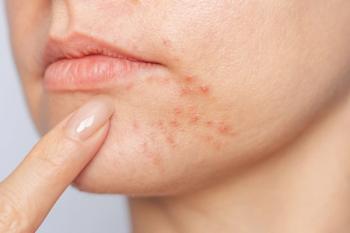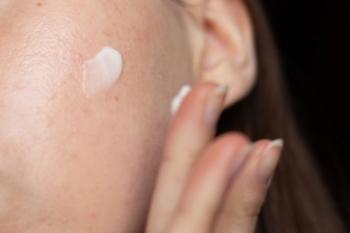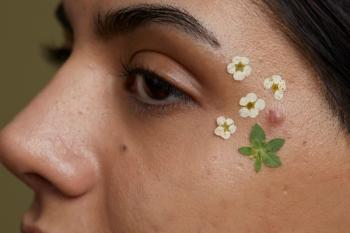
Gel could be as effective as microneedling
Small study shows that this topical solution could be as effective for treating post acne scarring as microneedling.
Home-based treatment with tazarotene gel could offer an alternative to microneedling for treating acne scarring, a small study published in the journal JAMA Facial Plastic Surgery suggests.
The study found that the home-based treatment regimen produced similar levels of improvement in acne scarring as microneedling.
Most patients with acne will experience some level scarring and around 40% will have levels considered clinically relevant scarring and which could impact on their quality of life without treatment.
Microneedling is commonly used to manage post acne atrophic scarring. And, three to five microneedling sessions at two-four week intervals has been shown to improve scarring by 50 to 70%. Microneedling has been compared with other office based dermatological procedures for post acne scars, such as chemical peeling, cryorolling, or carbon dioxide laser treatment, but there have been few head to head comparisons with strategies that could be undertaken by patients at home.
“A home-based topical treatment with a comparable efficacy to microneedling and that is well tolerated would be a useful addition in the armamentarium of acne scar management,” says Tarun Narang, M.D., Postgraduate Institute of Medical Education and Research in India.
Topical retinoids, such as adapalene and tazarotene, increase dermal collagen through their action on fibroblasts, and have been shown to be beneficial in preventing and treating acne scarring. Dr. Narang and co-authors set out to compare the efficacy of a home-base regimen of a retinoid (tazarotene gel, 0.1%) against the proven office based therapy of microneedling in 36 patients (13 men and 23 women) with a mean of 23.4 years (range 18-30 years).
All patients had grade two to four facial atrophic post acne scars and had not received procedural treatment for acne scarring within the last 12 months. The median duration of acne was six years (range 4-8 years).
Patients received four sessions of microneedling over three months to one side of their face using a dermaroller with a needle length of 1.5 mm. They were instructed to apply topical tazarotene gel, 0.1%, to the other side of the face once every night over this period.
A blinded observer assessed improvement in acne scar severity on both sides of patients’ faces three and six months after treatment using Goodman and Baron quantitative and qualitative scores, and complete data were collected on 34 patients.
After six months, 31 patients (91.2%) experienced an improvement in their acne severity and three patients (8.8%) did not. Ten patients (29.4%) experienced better improvement on the microneedling side of their face, six (17.6%) had better improvement on the tazarotene side, and 18 (52.9%) had similar improvement on both sides of the face.
At six months follow up, change in the median (IQR) quantitative score for acne scar severity indicated that there was significant improvement (P < .001) for both tazarotene (from a baseline of 8.0 [95% confidence interval 6.0-9.8] to 5.0 [95% confidence interval 3.0-6.0] and microneedling (from a baseline of 7.0 [95% confidence interval 6.0-10.8] to 4.5 [95% confidence interval 3.0-6.0]).
Median change in severity score was similar for both treatments 2.5 (95% confidence interval 2.0-4.0) for tazarotene compared with 3.0 (95% confidence interval 2.0-4.0) for microneedling ( P = 0.42).
Median qualitative acne scar scores were the same for both treatment groups at baseline and did not significantly change following either treatment.
No serious complications were reported for either treatment method throughout the study period. With microneedling, all patients had procedural pain and erythema, and seven patients (19.4%) had erythema lasting for more than 24 hours and two had post inflammatory hyperpigmentation.
Tazarotene caused dryness in 13 patients (36.1%) and scaling in eight patients (22.2%). These adverse effects were observed during the initiation of tazarotene therapy and were successfully managed with topical emollients.
“Tazarotene gel, 0.1%, would be a useful alternative to microneedling in the management of atrophic acne scars. Such a home-based medical management option for acne scarring may decrease physician dependence and health care expenditures for patients with post acne scarring,” the authors wrote.
REFERENCES
Afra TP, Razmi T M, Narang T, Dogra S, Kumar A. Topical Tazarotene Gel, 0.1%, as a Novel Treatment Approach for Atrophic Postacne ScarsA Randomized Active-Controlled Clinical Trial. JAMA Facial Plast Surg. Published online November 15, 2018. DOI:10.1001/jamafacial.2018.1404
Dogra S, Yadav S, Sarangal R. Microneedling for acne scars in Asian skin type: an effective low cost treatment modality. J Cosmet Dermatol. 2014;13(3):180-187. doi:10.1111/jocd.12095
Newsletter
Like what you’re reading? Subscribe to Dermatology Times for weekly updates on therapies, innovations, and real-world practice tips.











